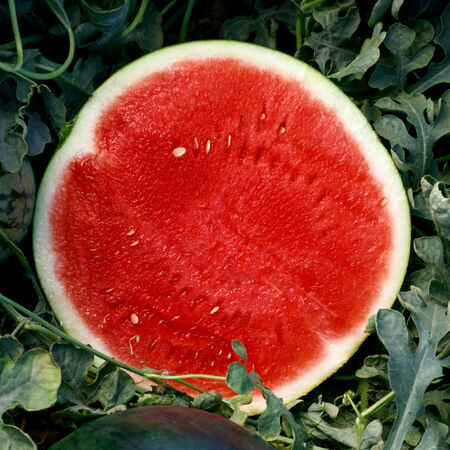Eclipse, (F1) Watermelon Seeds
Key Attributes
Key Attributes
Product Details
Weight
0.018Depth
0.2Height
4.5Width
3.25Plant Height
10-20"Botanical Name
Citrullus lanatus var. lanatusSeed Type
SeedSeeds Per Gram
14Seeds Per Pound
6,400Row Spacing
8'Packet
10 SeedsSow Depth
1/2"Seeds Per Ounce
400Fruit Color
RedBreed
F1 HybridSun
Full SunTypes
TRIPLOID WATERMELONSMaturity
Main SeasonFruit Weight
10-12 lbs.Life Cycle
AnnualSow Method
Direct SowPlant Spacing
18-36"Categories
WatermelonDays To Maturity (# Days)
80Seeds Per Acre
2.5 lbsComponents
Growing Instructions
![]() Learning Download: How to Grow Watermelon
Learning Download: How to Grow Watermelon
The sprawling plant is fun to grow for families. Planting watermelons from seeds allows gardeners to handpick which sort of fruit they want, as watermelon comes in seedless, different colors, large and small varieties. Seedless is one of the more common plants, and although the fruit is not completely seed free, the seeds are small, transparent and edible.
Before Planting: A light, well-drained soil with a pH of 6.5–7.5 and a southern exposure is ideal. Sow seeds outdoors after last frost is expect and soil temperatures are above 70°F. Triploid (Seedless) watermelon varieties need to be grown with Diploid (Seed) watermelon varieties for fertilization. Sugar Baby is good selection for a diploid fertilizer.
Planting: For direct seeding, sow 1–2 weeks after last frost when soil is warm, above 70°F, 3 seeds every 18–36″, 1″ deep. Thin to 1 plant per location when seedlings have first true leaves. If transplanting, sow 2-3 seeds, 1″ deep in a 2″ peat pot 2-4 weeks before last frost date (no sooner!). Germinate at 80°F then reduce to a constant 75°F). Keep well watered until 1 week before placing outdoors. Reduce water and temperature for a week to harden seedlings. Transplant 2–3′ apart in rows 6–8′ apart. Even hardened watermelon seedlings are tender! Do not disturb roots when transplanting, and water thoroughly.
Watering: When they are younger, watermelon plants require lots up water, up to 2 inches per week. If your able try not to water the fruits 1 week before harvest as over-watering can cause bland fruit.
Fertilizer: Prior to planting, amend soil with compost and a higher nitrogen fertilizer. Once vines begin to ramble, side dress plants with a 5-10-5 fertilizer and again once the melons are set.
Days to Maturity: There are 2 good ways to tell when a watermelon is ripe: 1) the tendril nearest the point on the vine where fruit stem attaches is browning/dead. 2) the spot where the fruit rests on the ground is pale yellow. (See each variety for days to maturity)
Harvesting: Once a watermelon is picked, it doesn’t ripen any further. To harvest, take a knife and cut
the watermelon from the plant, cutting the stem close to the fruit. Hold at 40-50°F and 85% relative humidity for 2–3 weeks. It is suggested to chill the watermelon prior to serving.
Tips: Pruning the plant is not necessary, but it may direct more energy to growing the fruits. If you choose to prune,
remove the small vines that grow laterally. To prevent rotting, gently lift the fruit as it gets bigger and turn it.
AVG. Direct Seeding Rate: 1 oz./340′, 1,000 seeds/500′, 3 oz./1,000′, 1⅓ lb./acre at 3 seeds every 18″, in rows 6′ apart.
Shipping Schedule
Our Seed Promise
 "Agriculture and seeds" provide the basis upon which our lives depend. We must protect this foundation as a safe and genetically stable source for future generations. For the benefit of all farmers, gardeners and consumers who want an alternative, we pledge that we do not knowingly buy or sell genetically engineered seeds or plants.
"Agriculture and seeds" provide the basis upon which our lives depend. We must protect this foundation as a safe and genetically stable source for future generations. For the benefit of all farmers, gardeners and consumers who want an alternative, we pledge that we do not knowingly buy or sell genetically engineered seeds or plants.
The mechanical transfer of genetic material outside of natural reproductive methods and between genera, families or kingdoms, poses great biological risks as well as economic, political, and cultural threats. We feel that genetically engineered varieties have been insufficiently tested prior to public release. More research and testing is necessary to further assess the potential risks of genetically engineered seeds. Further, we wish to support agricultural progress that leads to healthier soils, to genetically diverse agricultural ecosystems, and ultimately to healthy people and communities.
To learn more about the "Safe Seed Pledge" please visit www.councilforresponsiblegenetics.org.

